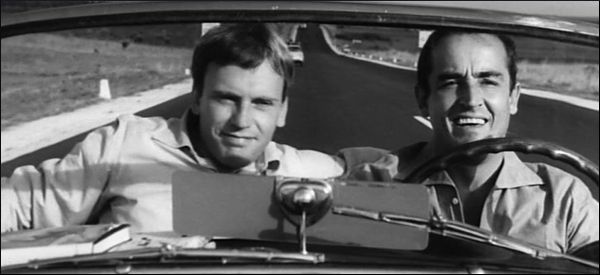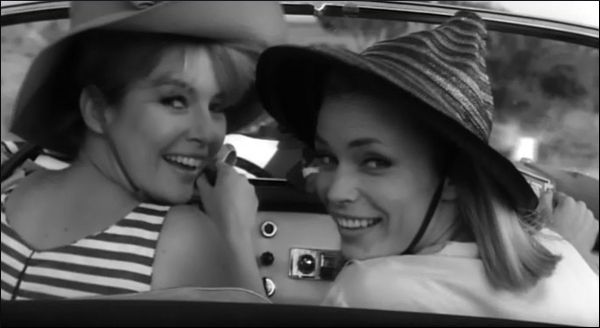
- Il Sorpasso
- 105 minutes - Comedy
- Original title: Il Sorpasso
- Director:Dino Risi
- Language: Italian
- Country: Italy
A timid student serendipitously ends up joining an unruly married man on an Italian road trip.

A timid student serendipitously ends up joining an unruly married man on an Italian road trip.
Il Sorpasso is one of the most famous Italian movies. Directed by Dino Risi and released in 1962, it is a typical commedia all'Italiana (comedy Italian-style), a film genre that characterized Italian cinema during the fifties and sixties and which introduced the world to such names as Vittorio Gassman, Alberto Sordi, Sofia Loren, Marcello Mastroianni, Dino Risi, and Mario Monicelli. This film is also one of the first examples of a "road movie" and a well-defined fresco of Italy during the post-war years of economic growth. Dennis Hopper said he was inspired by it when he made his American cult hit Easy Rider.
The plot revolves around the journey of two protagonists, Bruno (Vittorio Gassman) and Roberto (Jean-Louis Trintignant). The former is a brilliant, curious, and idle married man who behaves as if he were single, always hanging out in his car and in love with women; while the latter is a young, shy, introspective, and clumsy law student. During the annual Ferragosto holiday, while desperately looking for an open shop or a cigarette, Bruno casually meets Roberto and enters his home. The timid student, who was spending his Ferragosto studying, ends up going along with the visitor for the rest of the day, letting himself be convinced by Bruno’s intrusive, vigorous, but pleasing and very Romanesque manners: “Mamma dice che 'er lavoro nei giorni festivi non rende!” Together, they embark on a trip from a totally – and fascinatingly – empty Rome during Ferragosto towards the northern territories all the way to Toscana.

The movie’s success hinges on Gassman’s acting (which received Italy’s most prestigious film awards, a Silver Ribbon and a Donatello’s David in 1963) and on young Trintignant’s monologues. Their journey together is an initiation for both characters. At first, Roberto thinks he’s traveling with “a crazy man,” but gradually, watching Bruno and how he lives “for the moment,” Roberto’s opinion changes. Some encounters contribute to this evolution, such as meeting Bruno’s beautiful daughter (played by Catherine Spaak) and visiting his parental home in Grosseto, where Roberto lived as a child. There, he realizes that the “maladjusted” Bruno leads a more desirable life than his idealized uncle, who is also a lawyer, with his “normal life, a solid position, and a beautiful wife.” Roberto slowly discovers what it means to actually live. As he states, his day spent with Bruno is the “best of his life,” a clue that charges the ending with meaning.
Throughout the film, Gassman’s exceptionally natural speech oozes “Romanity.” He says words and phrases like “Haò,” used to catch someone’s or something’s attention, or “Li mortacci tua,” a generic insult aimed at someone’s genealogy, which is rude but has a folkloric tone. Audiences can also hear phrases like “Se lo semo bevuto” (literally “We drunk it,” although it is used to say, “We have overtaken him easily”) and “Fàmo alla romana” (literally “Let’s do it Roman-style,” meaning “Everything – usually food – pays for itself”). Bruno also calls Roberto “a-robbè,” since Romans use the typical “a-“ prefix to add emphasis. Almost the whole movie is in Roman Italian, although there are other accents, such as “sc'on di torìn” (a Piedmontese inflection) or “lo sentisti cumparuzzo” (Sicilian). Those without a good grasp of Roman Italian may not fully understand some of the dialogue, but the film beautifully portrays the “Italianity” of that period, a country still divided by social classes and immersed in an atmosphere of imminent “Americanization.” Il Sorpasso is still today a cult movie and without a doubt one of the most representative works of Italian cinema.
